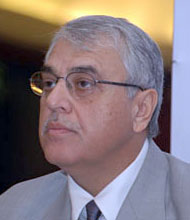Bottlenecks Top
India Agents Agenda

As air cargo growth gathers
momentum in India, stakeholders and industry experts want more action
on the ground. The infrastructure at airports continues to create major
bottlenecks for the movement of cargo. While this is one of the issues
about which the Air Cargo Agents Association (ACAAI) will debate in its
November convention in Bangalore (ACNFT reported about the meet
sometime ago), questions are being asked as to why the specially constituted,
aviation-related bodies have not been doing anything.
In fact, in 2006, freight forwarders and
airline representatives had approached the Ministry of Civil Aviation
through the ACAAI to find out if anything could be done to enhance cargo
facilities at airports in the country. A pro-active Civil Aviation Minister,
Praful Patel, then set up a committee to look into the matter. Termed
as the Civil Aviation Core Group (CACG), it had the Civil Aviation Minister
as its chairman. Among the others in the group along with the Secretary
of Civil Aviation (the top bureaucrat handling the Civil Aviation Ministry)
were Air India, Jet Airways and other private operators, Customs, all
the airport authorities of the country and the inter-ministerial group
(IMG), which consists of top government departments like the finance ministry.
ACAAI had been given a permanent invitee’s status.
For the first two or three years, the group
members met regularly, and various issues were sorted out through regular
interaction. However, after the retirement of the then Civil Aviation
Secretary, Ajay Prasad, the functioning of the group stopped. Today, the
CACG exists, but only in the files. According to highly placed sources
in the ministry, moves have been made to revive the group.
  Meanwhile,
around six months ago, the Civil Aviation ministry instituted another
committee. Known as the Forecasting Committee, its members comprise all
stakeholders in the air cargo business. Among the other members are representatives
from the Commerce Ministry and the IMG. This committee has been formed
to enhance the growth of the air cargo industry in the future. According
to sources in ACAAI, senior ACAAI members DHL’s Christoph Remund
(left) and former President Deepak Dadlani (right) submitted a forecast
for future requirements by the air cargo sector in respect to infrastructure
and other facilities. Meanwhile,
around six months ago, the Civil Aviation ministry instituted another
committee. Known as the Forecasting Committee, its members comprise all
stakeholders in the air cargo business. Among the other members are representatives
from the Commerce Ministry and the IMG. This committee has been formed
to enhance the growth of the air cargo industry in the future. According
to sources in ACAAI, senior ACAAI members DHL’s Christoph Remund
(left) and former President Deepak Dadlani (right) submitted a forecast
for future requirements by the air cargo sector in respect to infrastructure
and other facilities.
In fact, in private conversation with ACNFT,
most members expressed the hope that positive action would emerge from
the recommendations made in the few meetings that took place over the
last few months.
For its part, the Director General of Civil
Aviation also set up an All India Committee on Air Transport Experts in
July last year to bring quality and reliable forecasting of Air Traffic.
It would also act as a ‘Think Tank’ for the country’s
civil aviation industry. The establishment of this committee came as a
follow-up to the recommendations of a regional workshop on Civil Aviation
Statistics.
The recommendation stated that an Air Traffic
Experts Committee involving academics, professionals, practitioners, and
government and regulatory bodies be formed to bring quality and reliable
forecasting to support future air transport planning. The objective of
the committee is to develop a model of forecasting air traffic in the
country, both domestic and international, to support air navigation system
planning. The committee, besides forecasting, is also entrusted to look
into the growth trend of the industry compared with other regional corridors,
bilateral agreements, and airport infrastructure capacity building.
Tirthankar Ghosh
|



